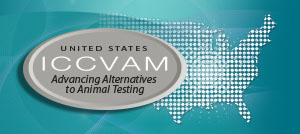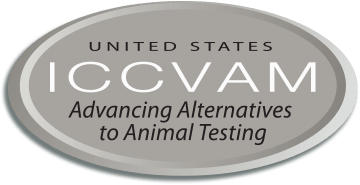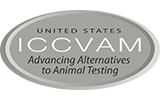To support developers of new testing approaches, ICCVAM is drafting a new document describing criteria and processes for validation and regulatory acceptance of toxicological testing methods. During 2020 and 2021, NIEHS and other ICCVAM member agencies also supported alternative methods development through grants to small businesses and academic institutions. These grants supported development of new testing approaches for ecotoxicity and models to advance COVID-19 research. They also supported development of platforms such as iPSCs and in vitro organoids, computational approaches, and methods to incorporate genetic diversity into NAMs.
Resources for Alternative Methods Development
Updated Criteria and Processes for Validation and Regulatory Acceptance of Toxicological Test Methods
In 1997, ICCVAM published Validation and Regulatory Acceptance of Toxicological Test Methods, which recommended criteria and processes for validation and regulatory acceptance of toxicological testing methods that would be useful to federal agencies and the scientific community. Approaches to validating new methods have evolved considerably since the publication of this document. New concepts have emerged related to the development of NAMs and the evaluation of their utility for regulatory uses, such as the qualification of a NAM for a particular context of use (also known as fit-for-purpose). However, guidance is needed on specific processes to put these concepts into practice.
In 2021, ICCVAM established a Validation Workgroup to consider this issue. The workgroup, which has members from nine ICCVAM agencies, is applying the advances of the last 2 decades to a new document describing criteria and processes for validation and regulatory acceptance of toxicological testing methods. In addition to supporting development of flexible validation practices that consider context of use, the new document will address the need to align validation approaches in a manner that encourages international harmonization and incorporates best practices for quality and quality systems development. The document will draw upon recent well-established validation publications to ensure alignment of approaches.
As of December 2021, drafting of the new document was in progress, and it is envisioned that it will be made available for public comment sometime in 2022.
Small Business Grants to Support Alternative Methods Development
Throughout 2020 and 2021, NIEHS provided funding for small businesses developing technologies of interest to the Tox21 program. The funding was offered as part of the 2020 and 2021 Omnibus Solicitations of NIH, Centers for Disease Control, and FDA for small business grant applications to support development and commercialization of innovative technologies. Technologies supported by NIEHS included improved or expanded testing methods for toxicity screening, computational approaches for predictive toxicology, and other technologies such as alternative or improved methods for fixing and preserving tissues.
In addition to funding offered via the Omnibus Solicitations, NIEHS offers grants to support development of specific types of technologies targeting specific endpoints. Funding offered in 2020 and 2021 supported development of:
- Chemical testing resources and approaches that reflect the genetic diversity among human populations, including panels of human or rodent cells or cell lines, lower organism strains with well-characterized genetic backgrounds, or in silico approaches to enhance the ability to characterize the effects of genetic variation in toxicity testing (December 2019, submissions open through February 2020).
- Application of artificial intelligence and machine learning for advancing environmental health sciences (December 2020).
Funding to Develop Machine Learning Tools
In March 2021, DOE announced availability of $29 million in grants to develop new tools to analyze massive amounts of scientific information. The grants were intended to support development of tools that use technologies such as artificial intelligence, machine learning, and advanced algorithms. They focused on two specific areas, data-intensive scientific machine learning and analysis to help detect patterns in data, and randomized algorithms for extreme-scale science to make large data sets easier to understand.
Grants to Develop In Vitro Models of SARS-Cov-2 Infection and Treatment
In April 2020, NCATS issued two Notices of Special Interest to support research in collecting and examining data on the risks and outcomes for COVID-19 infections using MPS. Such work is expected to advance the translation of research findings into diagnostics, therapeutics, and vaccines. Applications for administrative supplements and competitive revisions for existing grants to advance COVID-19 research were accepted through January 2022.
In a separate effort announced in September 2020, FDA awarded over $5 million to a global collaboration to inform the development of treatments and vaccines for coronavirus infections. The collaboration, led by the University of Liverpool, will sequence and analyze samples from humans and animals to create profiles of various coronaviruses, including SARS-CoV-2, which causes COVID-19. As part of this three-year project, investigators will evaluate how in vitro models of coronavirus infection, including human organs-on-chips, compare to in vivo responses in animal models and humans. Ultimately, these in vitro models may be employed in the development of biologics, drugs, or devices to treat COVID-19.
Grants to Support Development of PBPK Models
In January 2021, FDA CDER announced availability of grants to support development of PBPK models for bioequivalence studies for new generic drugs. CDER requested that proposals include scientifically justified IVIVE strategies, discuss how the models will address population variability, and describe a plan for how models would be verified and validated. The intent was to award a total of $600,000 over 2 years to one or two awardees.
Challenge to Develop Ecotoxicity Gene Expression Assay
In March 2020, EPA announced a partnership with DoD, international governments, and industry to sponsor the EcoTox TARGET innovation challenge. The challenge would award $300,000 to the applicant who successfully developed a low-cost high-throughput technology for measuring global gene expression in samples from four common aquatic toxicity test organisms. The winner will be announced in spring 2022.



